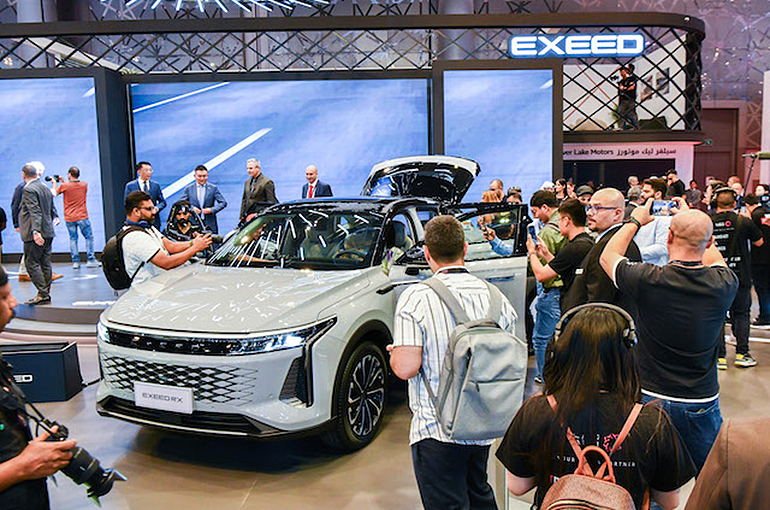 Local Flavor Guides Chinese Auto Brands to Succeed in the Middle East
Local Flavor Guides Chinese Auto Brands to Succeed in the Middle East(Yicai) Oct. 10 -- Chinese car bands have been quickly increasing their market shares in the Middle East in recent years due to localization and improved quality, as well as the fresh trend of new energy vehicles.
In Qatar, Chinese vehicles used to have less than 1 percent market share just six years ago, but it is set to increase to 12 percent this year, which worries Japanese and South Korean brands that have ruled the market for years, Ding Ping, who is in charge of Exeed sales at a local vehicle dealer called Silver Lake Motors, told Yicai. Exeed belongs to Wuhu-based Chery Automobile.
Last year, over 100,000 Chinese vehicles were sold in Saudi Arabia, the biggest auto market in the ME by sales, with an increase of 22 percent from a year ago, Ding said, adding that the combined market share surpassed 15 percent.
Chery alone occupied a market share of 10 percent in Qatar, falling behind only South Korea's Hyundai and Japan's Toyota and Nissan, an auto dealer in the ME for Japanese brands, said to Yicai. Chery's Tiggo 7 even surpassed Kia's Sportage and Toyota's Rav4, becoming the most popular compact sport utility vehicle in the Arab country.
"This year, we received training manuals from Japanese headquarters to deal with the Chinese competition," the dealer said. "In the manuals, models and market data of Chinese brands, including Chery, GAC, and MG, were laid out and analyzed in great detail." This shows the competition by China-made products has already made Japanese carmakers anxious and alarmed."
With almost two decades of experience selling Chinese cars in Qatar, Ding has witnessed the rise of Chinese brands in the region.
Although Chinese brands entered six Arab states of the Persian Gulf decades ago, their presence was meager before 2016, as the collective market share of Chinese carmakers in Qatar remained lower than 1 percent, Ding said, adding that their collective annual sales tallied less than 1,000 units for quite a long time, and low pricing was the usual sales driver.
However, since 2017, Ding noticed that many small SUVs of SAIC Motor's MG brand appeared on local streets. Not long after, vehicles made by GAC, Chery, Changan, and Geely started popping up. Over 20 Chinese marques have entered the market, per the automotive veteran.
Upgrades
The substantial improvement in quality, appearance, and interiors are the major factors that contribute to the success of Chinese automakers, according to Ding. Other factors are better air conditioning systems for the hot weather in the region, as well as the establishment of local after-sales networks. Despite the upgraded quality, Chinese brands kept their price advantage over Japanese and South Korean ones, Ding added.
Finally, the Covid-19 pandemic helped Chinese marques to seize a larger foothold in the ME as international manufacturers were struggling with a tight supply of automotive chips at that time. The pandemic gave people in the ME a unique opportunity to recognize Chinese brands as well as their powerful supply chain capabilities, per Ding.
The next battlefield is electric vehicles as Chinese carmakers have already set their eyes on the high-end market, and Qatar, the richest Arab country, is a good place to start.
Chery's Exeed showcases two new electric models, Sterra ES, and ET, at the ongoing Geneva International Motor Show 2023, which is held in Qatar for the first time ever, aiming to enter the local luxury electric car market.
A major target group of Exeed is the richest people in Qatar, per Ding. In 11 months since the brand entered the market, sales already topped 700 units, more than those of Infiniti, Volvo, and Genesis over the same period, making it one of the top 10 luxury vehicle brands, Ding said to Yicai. "There are many rich Qataris who own four to five vehicles at home and it is not a big deal for them to buy a new electric car," Ding said.
Despite the rapid success, Chinese carmakers still need to pay more attention to after-sales services because Japanese and South Korean rivals are still better at that, a local dealer told Yicai.
Employees sent from China to the ME are "either people who are familiar with technology but speak little English, or those who can speak English but know nothing about tech." Their experience and expertise need to be improved, the insider added.
Editors: Tang Shihua, Emmi Laine